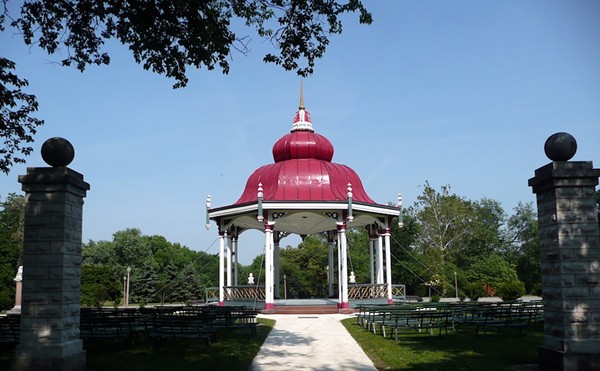When Frederick "Fritz" Lehmann IV discovered several years ago that his family's prized Chippendale chairs were missing from a downtown office building, he was called a liar and told that maybe the chairs were never there in the first place.
Now the four Chippendales — which sell for hundreds of thousands of dollars at auction — may be headed for an episode of the popular PBS television program Antiques Roadshow. The chairs were recovered April 17 in the Shaw neighborhood home of a 70-year-old St. Louis lawyer.
"Words fail me," says Lehmann, seeking to describe the chairs' mysterious journey over the last several years.
The Chippendales have a storied history. Handcrafted in the eighteenth century in England by Thomas Chippendale, a revered artisan to kings and queens, the high-backed chairs once graced the sprawling Connecticut estate of Seth Low Pierrepont, a millionaire and decorated U.S. diplomat.
Lehmann's deceased grandparents, St. Louisans John Allan and Marie Potter Love, who in the early 1900s founded the bank Prudential Savings & Loan, inherited the Chippendales from the Pierreponts in the 1960s.
Family lore has it that the Loves allowed no one to sit on the chairs. When taken last Friday from the dining room of St. Louis lawyer Francis H. Kennedy, private detective James Alan Anterio recalls, "They were covered — covered — with legal boxes and papers!"
The St. Louis Circuit Attorney's Office on April 24 charged Kennedy with one felony count of receiving stolen property.
Reached by phone last week, Kennedy declined comment.
Lehmann, a former St. Louisan now living in Austin, Texas, has kept an office dowtown for dcades where he's stored family heirlooms, in addition to documents belonging to the now-defunct International Micropatrological Society. In 1973 Lehmann founded the association, which "studied small and little-known nations and territories."
In 1998 Lehmann moved his possessions into the Security Building at 319 North Fourth Street, renting a one-room office on the sixth floor. In 2004 he put the Chippendales in the office and covered them with blankets.
"You have a single wooden door with a deadbolt lock and no maid service, so nobody is ever going in there. Short of a bank vault, I don't know what more I could have done [for safekeeping]," Lehmann stresses.
Lehmann, who came to town infrequently, says only he and the building's owner had keys to the office. On a trip here in November 2006, he discovered the chairs, along with half a dozen other antiques, were missing. But there was no sign of forced entry.
Lehmann says he learned through conversations with employees of property manager Colliers Turley Martin Tucker and primary tenant, the Lawrence Group, an architecture-and-design firm, that contractors were working on the windows, and the office doors, including his, had routinely been left open — without his knowledge.
"I was never notified. They never contacted me," grouses Lehmann. "If you leave chopped liver and steak out on the sidewalk and tell your dog to stay away from it and come back weeks later, it might be gone. And that's what the building did. I don't have enough vocabulary to describe what it is that I feel about the way I was treated as a tenant."
In a written statement, the Lawrence Group said: "During the entire renovation project, the site was fully supervised and all tenant spaces were fully secured."
States Colliers Turley Martin Tucker in its prepared response: "According to our records, at the time of the incident, a police report was filed and our management team cooperated fully."
Enter Anterio, the Orlando, Florida-based private detective who's made a name for himself in the art-crime world, thanks to his work on several St. Louis cases. His crowning achievement came in 2005, with the recovery of 100-plus artworks stolen from a Bridgeton warehouse by Biron Valier III and Donald Rasch (See Kristen Hinman's "Masterpiece Theatre," November 16, 2005.)
Anterio and his St. Louis partner, Jim Schuette, plied the proverbial shoe leather and learned from tenants in the Fourth Street building that Kennedy had an interest in antiques, and that he vacated the building in early 2006. The private eyes say they approached Kennedy, but he denied any involvement. Without a smoking gun, they had no case.
By April of this year, after having poured thousands of dollars into the investigation, Fritz Lehmann was ready to give up. According to his attorney, Chris Geldmacher, he went to break down boxes that had been stored in the office, and he found a shipping label with Kennedy's name on it.
The investigators proceeded to snap pictures of the chairs in Kennedy's Botanical Avenue dining room and presented their evidence to St. Louis police, who searched Kennedy's home on April 17.
According to Anterio, Kennedy confessed that a Lawrence Group employee told him Lehmann's office was virtually abandoned. Recounts Anterio: "So he just went in there and helped himself."
Says Lehmann: "It looks as though, if Mr. Kennedy has been telling the truth, the incredibly callous behavior of the building owners is what led him into temptation. I feel relieved, but I don't feel any particular gloating or hostility towards this Mr. Kennedy."
Anterio says he has the chairs in custody and is awaiting appraisal by Leigh Keno, a specialist in Chippendale furniture who is an appraiser on Antiques Roadshow. Adds Anterio: "I know a set of Chippendale chairs went for $13 million recently. I'm not saying these will, but...."





